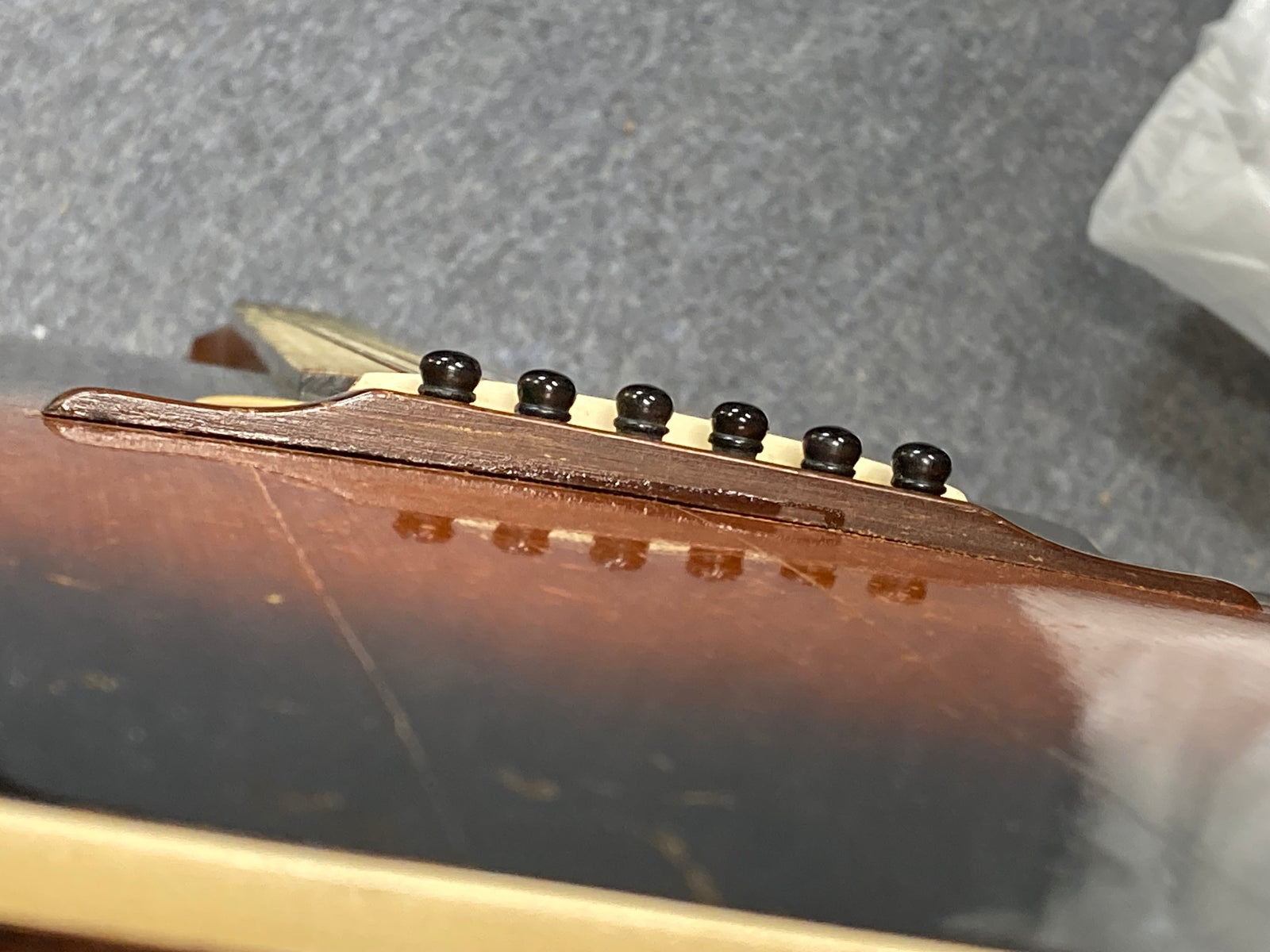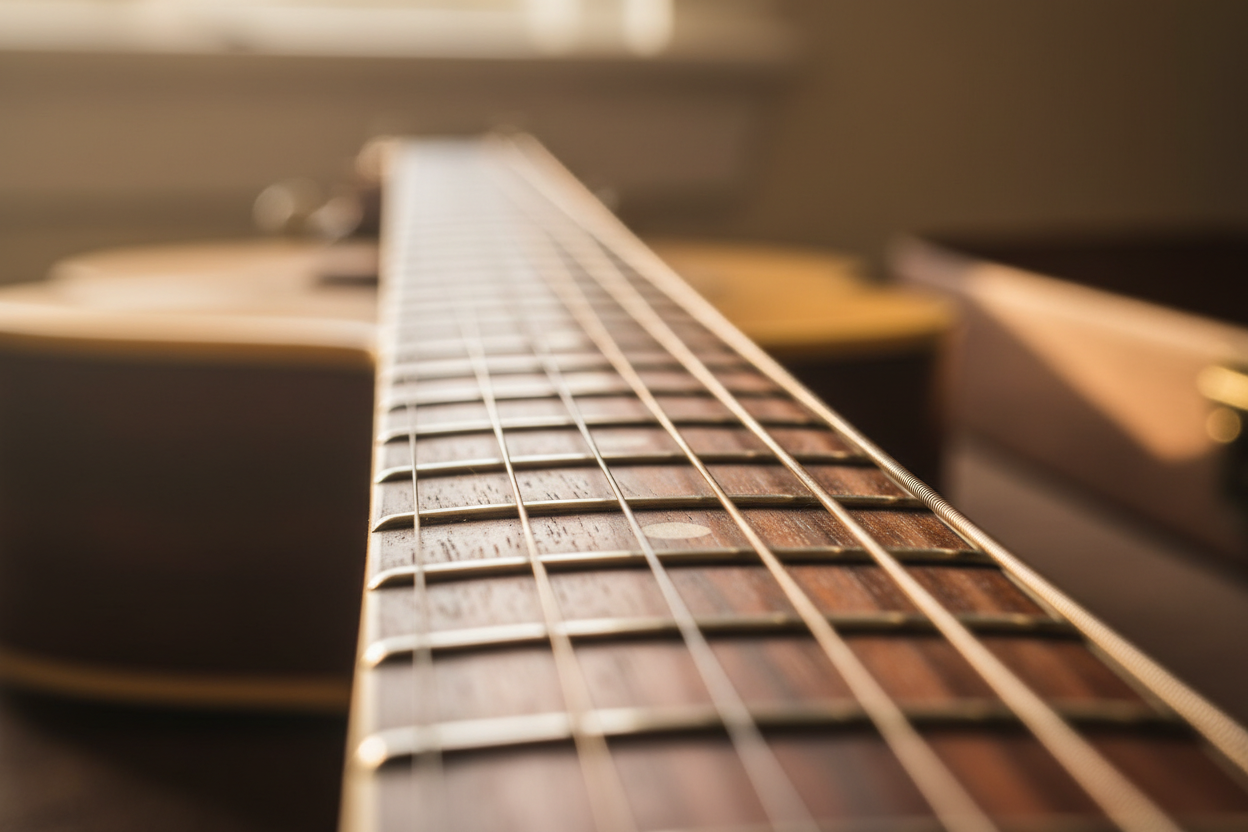Navigating the pre-owned guitar market can be akin to searching for treasure in uncharted waters. The thrill of discovering a hidden gem at a bargain price is undeniable, but the risks of stumbling upon a costly dud are equally real. This guide aims to be your compass, offering in-depth insights and practical advice to help you make informed decisions and find the guitar that not only plays beautifully but also enriches your musical journey.
Understanding the Landscape
The pre-owned guitar market is vast and varied, with instruments ranging from vintage classics waiting to sing again to neglected pieces on the brink of ruin. Knowing common issues and how they arise is the first step in navigating this landscape.
Common Pitfalls in Used Guitars
- Fret Buzz: This annoying sound occurs when the strings vibrate against the frets due to low action or uneven fret heights. Causes range from simple wear and tear to more complex issues like neck warping.
- Neck Issues: Warping or a "hump" in the neck can severely affect a guitar's playability. These problems often stem from exposure to fluctuating humidity levels or physical stress.
- Top and Bridge Problems: Sunken tops and lifted bridges are telltale signs of dehumidification damage, indicating that the wood shrunk and warped under the tension of the strings.
- Cracks and Structural Damage: Cracks in the wood, especially on the guitar's top, can compromise both the sound and structural integrity of the instrument. Cracks are also a good indicator that the guitar has dried out and likely has other performance issues.
- Electronics and Hardware: Scratchy potentiometers (pots) and malfunctioning pickups are common in electric guitars that haven't been maintained well.
The Perils of Bargain Hunting
The allure of a bargain can be misleading, especially in settings like garage sales or flea markets, where guitars have often been stored improperly. These environments can subject instruments to extreme conditions, leading to issues like warping, cracking, and other damage that might not be immediately visible but can significantly impact the instrument's functionality and tone.
The Online Marketplace: Opportunities and Obstacles
Online shopping offers a convenient way to access a wide array of options. However, it also presents unique challenges, particularly when dealing with private sellers. Photos and descriptions can be deceiving, and the lack of physical inspection can lead to unpleasant surprises.
Assessing an Instrument Online
- Detailed Photos: Request high-quality, close-up photos of key areas like the neck, bridge, fretboard, and any potential damage.
- Seller Reputation: Check the seller's history and reviews. Experienced and reputable sellers are more likely to provide accurate descriptions and stand behind their sales.
- Communication: Engage with the seller. Ask specific questions about the guitar's history, any repairs, and how it's been stored.
Evaluating a Guitar's Condition
Whether you're inspecting a guitar in person or evaluating one online, knowing what to look for can save you from making a costly mistake.
Visual and Structural Inspection
- Bridge Lift: Begin your inspection with the bridge. A visible gap between the bridge and the guitar's soundboard often indicates that the instrument has suffered from dryness, leading to shrinkage and the separation of glued joints. This gap is a clear warning sign of improper storage and potential dryness-related damage throughout the guitar.
- Neck Straightness: Assessing the neck's condition is crucial. Observe the neck from the headstock down to where it joins the body, looking for any signs of warping or twisting. Deviations from straightness could signal significant structural problems that might affect the guitar's playability and require professional intervention.
- Fret Condition: Carefully inspect the frets for any signs of wear, lifting, or unevenness, as these issues can significantly affect the guitar’s playability and intonation. Such repairs often require the expertise of a skilled luthier and can be costly. Additionally, play every note along the neck to ensure each one sounds clear. Any buzzing or muted notes indicate that the guitar may need servicing or repairs. We recommend against purchasing the guitar unless you fully understand the potential issues and are prepared for the possible expenses involved.
- Body Inspection: Carefully inspect the guitar's body, paying particular attention to any cracks. Focus especially on areas near the bridge and along the wood grain, where cracks are more likely to occur. While small cracks might be repairable, larger ones could threaten the structural integrity of the instrument.
- Sunken Tops: Look out for an inward sinking of the guitar's top, a common issue when an acoustic guitar experiences excessive dryness. This sinking not only affects the guitar's aesthetic but can also lead to significant playability and sound quality issues.
Playability and Sound
- Action: The distance between the strings and the fretboard affects playability. Extremely low action can cause buzzing, while high action may indicate neck or body issues.
- Intonation: Check if the guitar stays in tune up and down the neck. Poor intonation can be a sign of deeper problems.
- Electronics: For electric guitars, test all pickups, knobs, and switches for functionality and unwanted noise.
The Value of Expertise
For those new to guitars or unsure about their ability to assess an instrument's condition, consulting with or buying from a reputable dealer can provide peace of mind. Dealers with a strong track record are invested in customer satisfaction and are more likely to offer quality instruments that have been properly evaluated and set up.
The Dealer Advantage
- Quality Assurance: Reputable dealers often have in-house technicians who inspect and set up each instrument before it's sold, ensuring it meets a certain standard of playability and condition.
- Warranties and Returns: Many dealers offer warranties or return policies, providing a safety net that is rarely available when buying from private sellers or at auctions.
Navigating the Hunt
While the hunt for a used guitar can be exhilarating, it's essential to approach it with a healthy dose of skepticism and knowledge. Estate sales, flea markets, and even online listings can be goldmines, but they can also be minefields of damaged and poorly maintained instruments.
Estate Sales, Flea Markets and Yard Sales: Hidden Gems or Hidden Problems?
Estate Sales
Guitars sourced from estate sales often come with a history that can be both a blessing and a curse. While some of these instruments might have been cherished and well-maintained by their previous owners, the transition through an estate sale can cast doubt on their current state. The primary concern lies in the fact that the individuals responsible for the estate sale may not possess the necessary knowledge or resources to maintain these guitars properly. It's not uncommon for guitars to be stored improperly during the estate liquidation process, exposing them to conditions that can degrade their quality. When considering a guitar from an estate sale, it's imperative to conduct a thorough inspection, paying close attention to signs of neglect such as warping, cracking, and rust on hardware, which could indicate that the instrument was not stored under ideal conditions.
Flea Market Guitars
Flea markets offer a unique hunting ground for guitar enthusiasts, but they also present a myriad of environmental hazards that can compromise the condition of these instruments. Whether displayed under the harsh rays of the sun or sheltered under a roof, guitars at flea markets are rarely afforded the care they require.
Outdoor Displays: The Sun's Harsh ImpactGuitars displayed outdoors are directly exposed to sunlight, subjecting them to intense heat and UV radiation. This exposure can lead to significant issues such as warping of the wood, melting of the glue that holds the guitar together, and fading or cracking of the finish. The heat can cause the wood to expand and contract, potentially leading to irreversible damage that affects the guitar's sound and playability.
Indoor Displays: The Peril of NeglectEven guitars that are placed under a roof are not immune to harm. These indoor environments are often not climate-controlled, exposing instruments to fluctuations in temperature and humidity. Furthermore, guitars are frequently found leaning against tables or other items, treated as mere commodities rather than delicate instruments. This lack of care can lead to physical damage from being knocked over or compressed against hard surfaces, as well as environmental damage from prolonged exposure to adverse conditions.
In both scenarios, the common theme is a disregard for the proper maintenance and storage of musical instruments. When considering a purchase at a flea market, it's crucial to thoroughly inspect the guitar for signs of environmental and physical damage. Check for warping, cracks in the wood, issues with the glue and finish, and any other indicators that the guitar has not been well-maintained.
Given the risks associated with flea market environments, potential buyers should approach these finds with caution. If a guitar has been subjected to these conditions for an extended period, it may require significant restoration to return it to playable condition. Consulting with a professional luthier can provide a clearer understanding of the instrument's state and the feasibility of any necessary repairs, helping to ensure that your investment is sound.
Yard Sale Guitars: Caution Advised Due to Common Storage Pitfalls
When exploring yard sales in search of a guitar, it's essential to bear in mind the typical backstory of these instruments. A significant number of guitars found at yard sales have spent years hidden away in the least hospitable environments for a musical instrument: attics, basements, garages, and closets. These storage spaces, often chosen for convenience rather than the preservation of condition, present a host of challenges to the well-being of a guitar.
Guitars Stored in Attics, Basements, or Storage Units
Attics, especially, are notorious for their extreme conditions. During the summer months, the heat in an attic can soar, leading to the drying out of wood and the potential for cracks to develop in the guitar's body. The glue that holds various parts of the guitar together can also become compromised, leading to structural failures.
Basements present the opposite problem. Their propensity for dampness and fluctuating humidity levels can cause wooden instruments to swell and warp. Such conditions are ripe for mold growth and can lead to the rusting of metal components, such as tuners and frets, further diminishing the instrument's value and playability.
Garages and storage units, while perhaps not as extreme, are still far from ideal due to their lack of climate control. The frequent shifts in temperature and humidity within these spaces can lead to similar issues of warping, swelling, and cracking, posing significant risks to the structural integrity and overall sound quality of the guitar.
Given these prevalent storage-related risks, it's crucial for potential buyers to approach yard sale guitars with a heightened level of scrutiny. Inspecting for signs of environmental damage, such as warping, cracking, and rust, becomes even more imperative.
Understanding that these instruments may have been subjected to adverse conditions can help set realistic expectations regarding their condition and the potential need for repairs or restoration.
Purchasing a guitar from a yard sale can still be a rewarding experience, but being informed about the common pitfalls associated with their typical storage histories is key to making a wise investment.
Navigating Pawn Shops and Music Stores with Caution
Pawn Shops: A Mixed Bag of Treasures and Traps
Pawn shops can be intriguing places to find guitars, offering a wide range of instruments, from forgotten treasures to neglected pieces in need of care. However, the nature of pawn shop inventory means that these guitars may not have received consistent maintenance or proper storage.
The staff might not be specialized in musical instruments, leading to a lack of understanding about the specific care guitars require.
When considering a guitar from a pawn shop, it's essential to carefully evaluate its condition, paying close attention to signs of neglect such as warping, cracking, and rusting components. Verifying the guitar's playability and ensuring it has been stored under appropriate conditions while in the shop is crucial.
Music Stores Without Proper Humidification: Buyer Beware
Even some guitar or music stores, particularly those that may not specialize in high-end instruments, might not maintain optimal humidity levels for their inventory. Guitars are sensitive to changes in humidity, and improper levels can lead to issues like fret buzz, warping, and cracking.
When visiting guitar stores, take note of the environment. Is there evidence of a humidification system in place? Are the guitars properly stored and cared for? Stores that lack these measures may inadvertently be selling guitars that have already sustained damage due to environmental conditions. Always inspect the instruments thoroughly and consider the store's environment as a factor in the guitar's current and future condition.
In both pawn shops and guitar stores lacking proper humidification, the key is diligence. Be prepared to conduct a thorough inspection and, if possible, bring along a knowledgeable friend or consultant if you are not sure how to identify potential guitar related issues. This will ensure that you make a well-informed decision and select a guitar that will be a joy to play for years to come.
The Diamond in the Rough
Despite the risks, certain guitars are worth the effort and cost of restoration. Vintage American-made guitars from brands like Martin, Gibson, and Fender, as well as select imports from the '60s, can be valuable finds. The key is knowing when an instrument's potential value justifies the investment in repairs.
Final Thoughts: Navigating Your Way to a Quality Used Guitar
In closing, it's vital to acknowledge that while the hunt for a used guitar can lead to fantastic finds, success heavily depends on your ability to evaluate what's in front of you. Through my experiences at different sales venues, it's clear that a good number of these guitars are far from perfect. However, that doesn't eliminate the chance of uncovering a valuable piece. The drive behind writing this article is the frequent sight of guitars in our shop needing repairs—guitars bought by enthusiastic yet uninformed individuals from the used market. This piece aims to provide you with the knowledge to make a purchase you'll be happy with, avoiding the common traps that lead to buyer's remorse.




